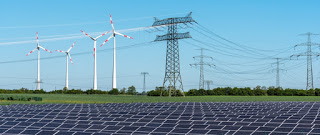Renewable Energy Transition; affordable and clean energy for all is possible
For about three centuries now, the activities and progress of our world has been powered by fossil fuel.
We have lived to accept that fossil fuel consumption cannot be exempted from our everyday activities, right from cooking our foods to fueling our vehicles to powering our machines.
The use of fossil fuel is inevitable in both obvious and subtle ways.
However, in the past decades, a series of concerns have been raised about the disadvantages of fossil fuels on the environment. It is alluded that, the continuous usage of fossil fuel will lead to environmental catastrophe. Due to this, the world is drastically drifting to the usage of safer and renewable energy.
This is why in the latest dialogue held by the Natural Resource Governance Institute (NRGI) on energy transition for civil society and media it was noted that, even though Ghana has not contributed much to global climate change but this global climate change will affect Ghana in any case.
Now, one may ask what is renewable energy? Renewable energy is useful energy that is collected from renewable resources, which are naturally replenished on a human timescale, including carbon neutral sources like sunlight, wind, rain, tides, waves and geothermal heat.
Renewable energy transition however, is the ongoing energy transition which is replacing fossil fuels. This transition can positively impact our environment. The following are some of the benefits of transitioning to renewable energy.
Read More: Napo bags Honourary Doctorate from UEW
First and foremost, the energy transition is to limit the adverse effects of energy consumption on the environment which includes the reduction of the emission of greenhouse gases and the mitigation of climate change. The burning of fossil fuel leads to the emission of greenhouse gas which causes problems for humans, animals and the environment in general.
Studies have proven that renewable energy resources produce low to zero carbon or greenhouse gases. Thus, environmental related issues such as premature death of humans, loss of livestock and wildlife, reduction in crop yield due to acidic rain, loss of fish population, air pollution and rise in sea level will be massively minimised should the country switch to hundred percent renewable energy.
The United Nations Industrial Development Organisation (UNIDO) at its 2017 conference revealed that, indoor pollution because of the use of fossil fuel caused 2 million deaths in 2016, and 4 million as at October, 2017, this figure is four times the number that dies from malaria. This goes to say that fossil fuel consumption is dangerous to our health and lives. Renewable energy is more environmental friendly.
With the numerous potential benefits of renewable energy, governments around the world have imposed myriad restrictions on the consumption fossil fuel. Most developed countries have enacted Acts to address the dangers of fossil fuel combustion. The question here is, is the government of Ghana taking strategic measures to minimise the consumption of fossil fuel? Is Ghana economically ready to switch to hundred percent renewable energy? Is Ghana going to join the world on this energy transition even though it will devalue the country’s second largest export which is oil?
This is why Mr Denis Gyeyir of the NRGI advised the government in their last dialogue they held on energy transition. He said that government finances will be affected, borrowing may continue to increase and fiscal challenges are imminent. For the government to vigorous pursue the renewable energy agenda, there should be a plan to deal with the economic risks of reduced or no oil revenues due to energy transition. He also mentioned that Ghana National Petroleum Corporation GNPC must begin investing strategically to remain relevant even when oil and gas is no longer as valuable.
By Zara Yussif


